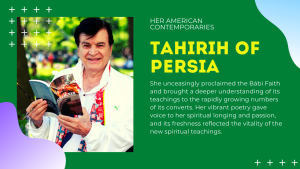
 Championing women’s rights has become more important in recent years and you might think that fight for female justice started in the 1960s, or perhaps after WWI when Women’s Suffrage was pushed forward. In truth, there were two simultaneous struggles for women’s rights, both of which started in the mid 19th century. One of them is known by an early meeting in Seneca Falls, New York, in 1848 and the other began in Persia (now Iran) in the 1840s.
Championing women’s rights has become more important in recent years and you might think that fight for female justice started in the 1960s, or perhaps after WWI when Women’s Suffrage was pushed forward. In truth, there were two simultaneous struggles for women’s rights, both of which started in the mid 19th century. One of them is known by an early meeting in Seneca Falls, New York, in 1848 and the other began in Persia (now Iran) in the 1840s.
In the 19th century, countless individuals believed a new Revelation was imminent. In Persia, the Báb fulfilled the prediction by several clerics of the appearance of the Promised Qa’im. Tahirih of Qazvin, a gifted teacher, was at the vanguard of spreading the Báb’s teachings. She unceasingly proclaimed the Bábi Faith and brought a deeper understanding of its teachings to the rapidly growing numbers of its converts. Her vibrant poetry gave voice to her spiritual longing and passion, and its freshness reflected the vitality of the new spiritual teachings. She emerged as the most outspoken of the Bábi leaders. The authorities responded by having her murdered in the dead of night. The memory of her life survives in her poems. At the same time, many Americans believed the Second Coming of Christ was imminent. Several churches and movements emerged, some founded by women. Among them was Ellen G. White, a theological thinker who shaped the beliefs of the Adventist movement, Sojourner Truth, who came up from slavery to electrify audiences with her salvation preaching, and Mary Baker Eddy, founder of the Church of Christian Science; these women leaders were prefigured in the 18th century by ‘Mother’ Ann Lee, founder of the Shakers, and the long-forgotten female ‘exhorters’. In the hearts of Persian and American women, God’s hand was at play, orchestrating a realization of the spiritual basis of life and the need to move towards oneness.



